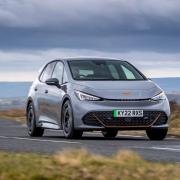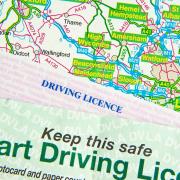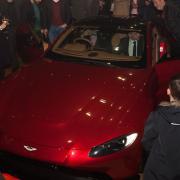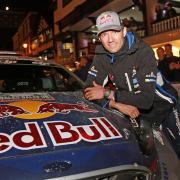Macclesfield's motor racing champion and land speed record holder Graeme Smith explains why he loves his little Smart car
The contrast could hardly have been greater. Joe Wales, great-grandson of speed legend Malcolm Campbell reached about 140mph in a shiny electric supercar which arrived on a trailer. He had a support team of 50 people clearing the track before he made his record attempt in front of an expectant crowd and the glare of the media spotlight.
Graeme Smith had driven the scenic route to the event at Pendine Beach in South Wales with his one-woman support team, girlfriend Karen. He had to unload their luggage from the boot of the one litre Smart car and pile it on the sands before he could try to set his record.
But in spite of the obvious gulf, it was Graeme from Macclesfield who returned home with a UK speed record that weekend, although he is still waiting for the records to be ratified by the Motor Sports Association.
Graeme, 40, who works for Astra Zeneca, reached an average speed of 70.19mph over a quarter mile and also claimed the one mile and 500 metre flying start records.
‘Donald and Malcolm Campbell were big heroes of mine and I have wanted a land speed record since I was young,’ Graeme said. ‘But most of the records need years of planning and thousands or hundreds of thousands of pounds, which I haven’t got.
‘It is just a normal run-around car, it’s the car I drive to work every day. It hasn’t had any modifications or safety equipment added.’
Graeme was just the latest in a long line of speed heroes to set records at Pendine – the world landspeed record was set there a number of times by drivers including John Parry Thomas and Malcolm Campbell. But Malcolm’s great-grandson failed in his latest attempt when his electric car hit a pothole at over 100mph, smashing its front suspension.
Graeme bought his record-breaking car a year ago to avoid another winter taking his motorbike along treacherous, icy roads, but even then he had on eye on the record. ‘I did have those two things in mind and have been looking out for someone making a record attempt that I could piggy back on.
‘I did no training for the attempt at all, except some motorway journeys, but whatever I had done couldn’t have prepared me for driving at those speeds on the sand. It was quite terrifying and would have been so much easier and the speeds higher, if we had been on tarmac, the sand takes about 10 per cent of your top speed.
‘No-one in over a century of British speed records has attempted records in the class, so it was a relatively easy batch of records to attack. It wasn’t a difficult engineering project, nor a particularly brave feat of driving, but a record is a record.
‘This was the most obvious easy record to go for and I may try to beat it in the future but there are other soft records to go for as well. Five miles, ten miles, fifty miles a hundred miles, an hour – there’s all sorts to go for.
‘Hopefully this will inspire others to go out to try to break it or set records in other classes. However, it isn’t such a soft target now as the new records would have to be beaten by at least one-percent to be recognised and a modified car would require a lot of safety equipment. If someone does better it, I have plans to take it back by transplanting the engine into another chassis.’


























